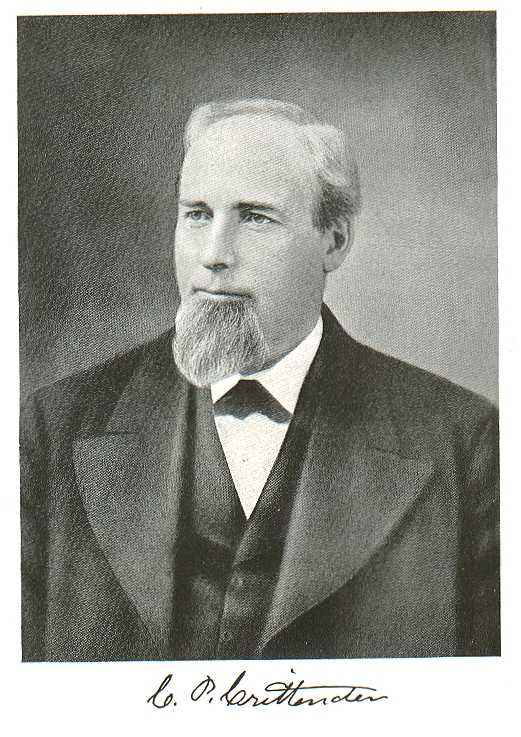
CHARLES PECK CRITTENDEN
Charles Peck Crittenden was one of the sterling pioneers of San
Francisco, a reliable and successful business man, and a citizen who while
never prominent in politics exercised a quiet and unmistakable influence for
good.
He was born at Phelps, Ontario County, New York, February 10, 1829,
representing the New York State branch of the Crittenden family, which was
descended from Hon. Abraham Crittenden. Abraham Crittenden of Kent, England
came on the ship St. John, reaching new Haven, Connecticut, June 1, 1639, and
settling at Guilford, Connecticut. He signed the plantation covenant with
twenty-five other gentlemen in June 1639, and took the oath of fidelity May 4,
1645. He was Governorís assistant of the colony of New Haven, and was treasurer
of the colony from 1657 to 1660. Some of his descendants moved to Virginia,
some to Kentucky and others to New York State. The Crittendens in New York
bought from the Indians a thousand acres situated near Seneca and Cayuga lakes.
Charles Peck Crittenden came to California when he was twenty-one years
of age. He left New York on the sailing vessel The Eliza Jane which went around
the Horn, and on account of stormy weather and other accidents arrived many
weeks overdue at San Francisco, August 29, 1850. The crew had been reduced to
eating moldy and maggoty biscuits, and water was rationed out in very small
quantities. Charles P. Crittenden arrived in San Francisco about ten days
before California was admitted to the Union, and thus had the distinction of
being a territorial pioneer. For a time he engaged in mining in Yuba County. On
October 17, 1853, he married Deborah K. Scott, who had arrived in San Francisco
the same day. They had been engaged before he started for California. Her former
home had been Waterloo, Seneca County, NewYork. They were married by the Rev.
W. Rollinson at the home of Mr. Wheaton in Hardy Place, a short street off of
Kearny, between Sutter and Bush streets. Hardy Place, in former years was a
street containing many substantial homes, and many of these had been shipped
from the East, the timbers being set up after reaching San Francisco.
Since the earthquake and fire of 1906 Hardy Place only recently was
restored to the street nomenclature of San Francisco, though with the incorrect
spelling of Hardi. Following their marriage Mr. and Mrs. Crittenden took a
drive out on Mission road and through the deep sand and over the old City Hall
site, but finding the day cold and foggy they soon returned to the house. After
his marriage Mr. Crittenden was engaged in the lumber business near Redwood
City until 1854, and about a year later moved to San Jose, which remained hi
home until a few years before his death. In the later years of his life he was
associated with J. Z. Anderson in shipping fruit East.
Mr. Crittenden was a member of the first company of volunteer firemen
formed in San Jose. He also helped build the First Baptist Church there, and
was a member of that church. October 5,1861, Governor John G. Downey appointed
him a second lieutenant, Union Guards, San Jose, Volunteer Company of Infantry,
First Brigade, Second Division, William C. Kibbe, quartermaster and
adjutant-general, Johnson Price, secretary of state. October 12, 1863, Governor
Leland Stanford appointed him first lieutenant of the San Jose Union Guards,
vice C.M. Hamilton, whose term expired, his rank to run from September 26,1863.
March 6, 1865, Governor Fred F. Low appointed Mr. Crittenden captain, to rank
from February 20, 1865, of Company N, San Jose Union Guards, Fifth Infantry
Regiment, Second Brigade, California Militia, to succeed J. J. Owen, resigned.
These companies were formed of the best men, known for the Union loyalty, and
while they were not called out of the state they did some effective work in maintaining
an unblemished record of fidelity to the Union in California.
Throughout his civilian career Mr.
Crittenden was equally known for qualities that made him reliable and
respected. He was a man of few words, plain spoken, but his real worth was
recognized and appreciated.